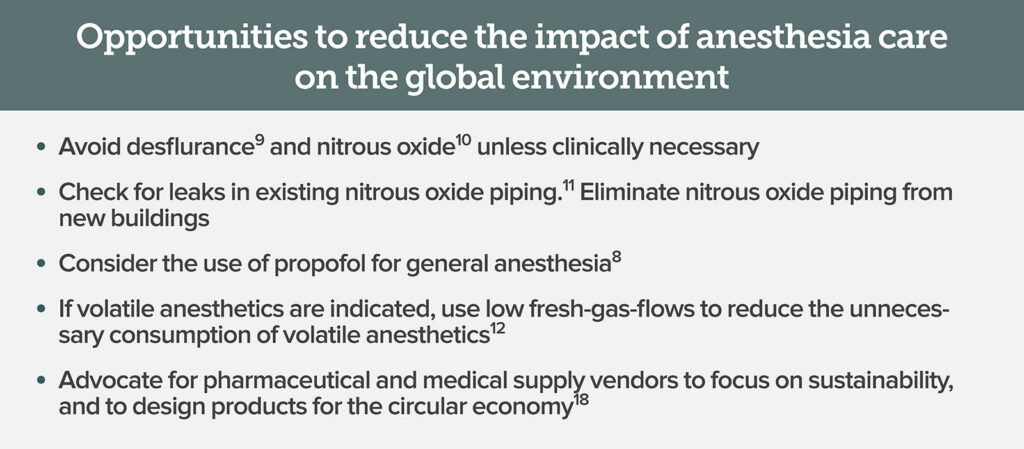Episode #102 The Next Patient Safety Movement: Sustainable Health Care
June 14, 2022Welcome to the next installment of the Anesthesia Patient Safety podcast hosted by Alli Bechtel. This podcast will be an exciting journey towards improved anesthesia patient safety.
Today, we are talking with Matthew Meyer and Jonathan McBride, authors of the APSF article, “Sustainable Health Care Must Be the Next Patient Safety Movement.” You can find this Letter to the Editor in the June 2022 APSF Newsletter.
Here is a list of the articles that we talk about during the interview:
MacNeill AJ, Lillywhite R, Brown CJ. The impact of surgery on global climate: a carbon footprinting study of operating theatres in three health systems. Lancet Planet Health. 2017 Dec;1(9):e381-e388. doi: 10.1016/S2542-5196(17)30162-6. Epub 2017 Dec 8. PMID: 29851650.
Be sure to check out the APSF website at https://www.apsf.org/
Make sure that you subscribe to our newsletter at https://www.apsf.org/subscribe/
Follow us on Twitter @APSForg
Questions or Comments? Email me at [email protected].
Thank you to our individual supports https://www.apsf.org/product/donation-individual/
Be a part of our first crowdfunding campaign https://www.apsf.org/product/crowdfunding-donation/
Thank you to our corporate supporters https://www.apsf.org/donate/corporate-and-community-donors/
Additional sound effects from: Zapsplat.
© 2022, The Anesthesia Patient Safety Foundation
Hello and welcome back to the Anesthesia Patient Safety Podcast. My name is Alli Bechtel, and I am your host. Thank you for joining us for another show. We are so excited that it is June because that means that the June 2022 APSF Newsletter is here. There is a lot of great content all about anesthesia patient safety and we are going to be talking about it right here on the podcast.
But before we dive into the episode today, you’ve heard me recognize our corporate supporters on this show, but there’s another supporter who is absolutely essential – YOU! Every individual donation matters so much. Please visit APSF.org and click on the Our Donors heading and consider making a tax-deductible donation to the APSF.
We are opening the June 2022 APSF Newsletter and turning our attention to a Letter to the Editor called, “Sustainable Health Care Must Be the Next Patient Safety Movement” by Jonathon McBride and Matthew Meyer. To follow along with us, head over to APSF.org and click on the Newsletter Heading. First one down is the current issue. Then, scroll down until you get to the Letters to the Editor section and click on our featured article today. I will include a link in the show notes as well.
Did you know that a year ago in British Columbia during a massive heat wave, an elderly patient developed dyspnea and received the diagnosis of “climate change?” This is the first known patient to receive this diagnosis, but the authors tells us, that she will not be the last. The authors give us a call to action upfront since inhalational anesthestics contribute significantly to the health care sector greenhouse gas emissions and this is one area that anesthesia professionals may be able to modify their clinical practice and continue to keep patients and the environment safe. Here’s the summary of the article:
“The next patient safety movement is sustainable health care. Anesthetic gasses make an unexpectedly large contribution to health care pollution and emissions. This gives anesthesiologists the opportunity to lead in the effort to reduce health care’s impact on population health. If we can markedly reduce our specialty’s emissions, we can demonstrate to the entire health care sector that sustainable health care is possible and important to the well-being of our patients.”
The authors also provide a guide for anesthesia professionals to be able to work towards a more sustainable health care system. Check out figure 2 in the article. Here are the opportunities that the authors provide:
- Avoid Desflurane and Nitrous Oxide unless clinically necessary
- Check for leaks in exisiting nitrous oxide piping. Consider eliminating nitrous oxide piping from new buildings.
- Consider the use of Propofol for general anesthesia.
- If volatile anesthetics are indicated, use low fresh gas-flows to reduce the unnecessary consumption of volatile anesthestics.
- Advocate for pharmaceutical and medical supply vendors to focus on sustainability, and to design products for the circular economy.
We hope that you will check out the article, but now we are so excited to hear from the authors of the article, McBride and Meyer, on the show today. They are so passionate about this topic, so stay tuned!
Are you an advocate for sustainable healthcare at your institution? Let us know by tagging us on Twitter using the #APSFPodcast and join us next week as we continue the conversation with Meyer and McBride.
If you have any questions or comments from today’s show, please email us at [email protected]. Please keep in mind that the information in this show is provided for informational purposes only and does not constitute medical or legal advice. We hope that you will visit APSF.org for detailed information and check out the show notes for links to all the topics we discussed today.
Let’s keep the conversation about anesthesia patient safety going all week long in between the podcast show releases. We would love to connect with you on Twitter, Instagram, Facebook and LinkedIn. What are you waiting for? Go ahead and tag us in a patient safety related tweet or like our next post on Instagram, like us on Facebook, or connect with us on LinkedIn!! We can’t wait to hear from you.
Until next time, stay vigilant so that no one shall be harmed by anesthesia care.
© 2022, The Anesthesia Patient Safety Foundation


